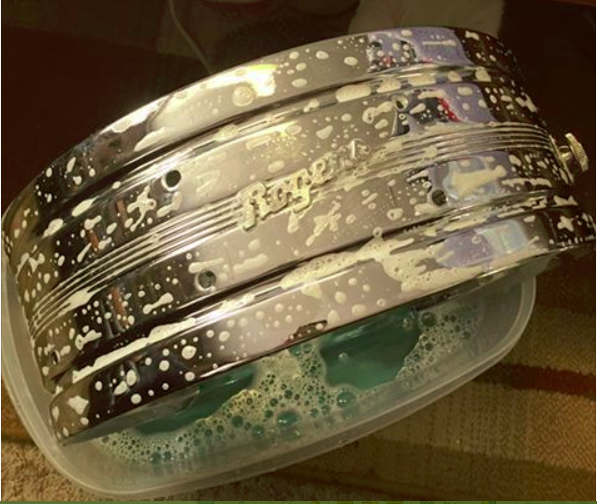So, the question continues to come up amongst the drummer environment… ? “How do you clean chrome on your drums?”
Well, after some deep and exhaustive research I’ve discovered some very interesting and powerful conclusions from the professionals out there… Here are some specific ‘bullet point’ details regarding this subject matter…
You do not want any ‘spider webbing’ what-so-ever… learn how to prevent this and read on!
Jam On!
– Ron
Only let your drum take a comfortable ‘bath’ and do not allow it to experience a rough treatment… for example…
- * Never Steel Wool to clean chrome drums.
- * Never Ever. Never dry wipe a dirty drum.
- * Never attempt to clean a dirty drum without a full, and careful disassembly.
- * Never follow a famous persons recommendation to use steel wool. (if you wait long enough, there WILL be one.)
- * Never use a power operated tool for disassembly or assembly.
- * Get the right tools for the job, in good condition, and don’t cheat.
- * Dawn (or equivalent) liquid dish soap is safe on chrome.
- * Stay away from rough fabric and use only soft cotton cloths.
- * After disassembly soak parts in a solution of Dawn (or any soft water suds maker) and water for several hours.
- * If the [your] shell has no paper tag or other badge that would be damaged by immersion, soak that also. If it does use damp cloths to saturate the grime on the shell, and then, once saturated, clean it.
- * Always ‘SAVE’ any provenance tags / originality!
- * Rinse to remove all residue, and dry.
- * For your parts… clean, rinse and dry. Then use your polish of choice… Meguire”s, Mother’s, Blue Magic, Flitz, and Never-Dull, are just a few brand names of products that are safe for chrome with no abrasive qualities!
- * Be sure your fastener threads are clean with any spall (look it up) – especially with thread cutting fasteners removed from the threads, and any residual removed from the lug bosses and other parts. Carefully start the screws so that no cross-threading occurs.
- * Do not over tighten anything!
And if the job is beyond one’s individual skill, please consider hiring a professional.

